Business Law Report: Contract Formation and Consideration
VerifiedAdded on 2021/04/21
|6
|1126
|62
Report
AI Summary
This business law report examines several contractual issues arising from a scenario involving Nick and various parties. The report analyzes whether valid contracts were formed between Nick and John (catering services), the police (additional protection), Hanson (services), and Ian (funding). It applies contract law principles, including offer, acceptance, consideration, and intention, to determine the enforceability of each agreement. The analysis considers the existing duties of each party, distinguishing between contractual obligations and public duties. Cases like Collins v Godefrey, Stilk v Myrick, and Combe v Combe are applied to the facts, addressing issues of consideration, existing duties, and promissory estoppel. The report concludes with a summary of the contractual claims that can be made by each party based on the legal analysis.
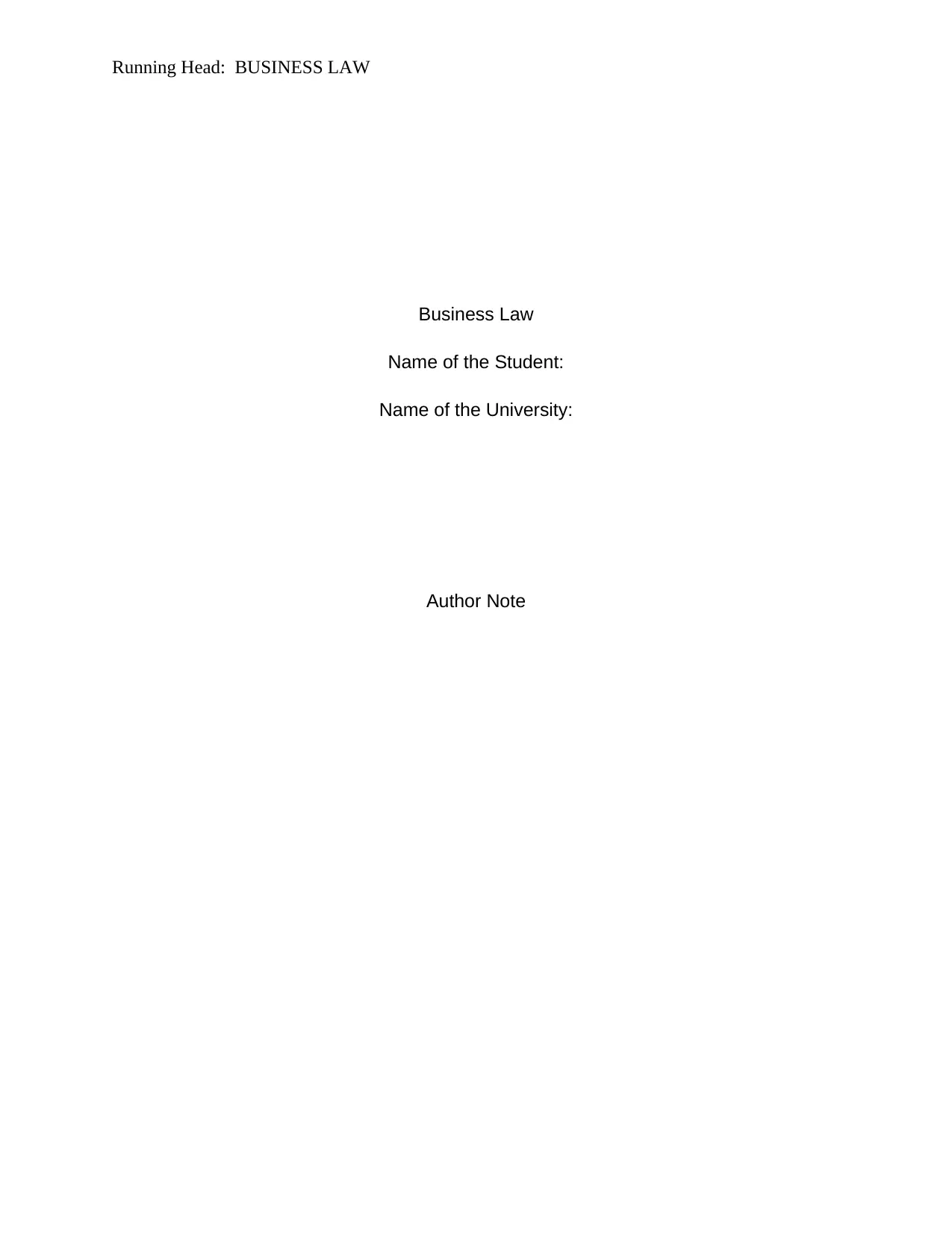
Running Head: BUSINESS LAW
Business Law
Name of the Student:
Name of the University:
Author Note
Business Law
Name of the Student:
Name of the University:
Author Note
Paraphrase This Document
Need a fresh take? Get an instant paraphrase of this document with our AI Paraphraser
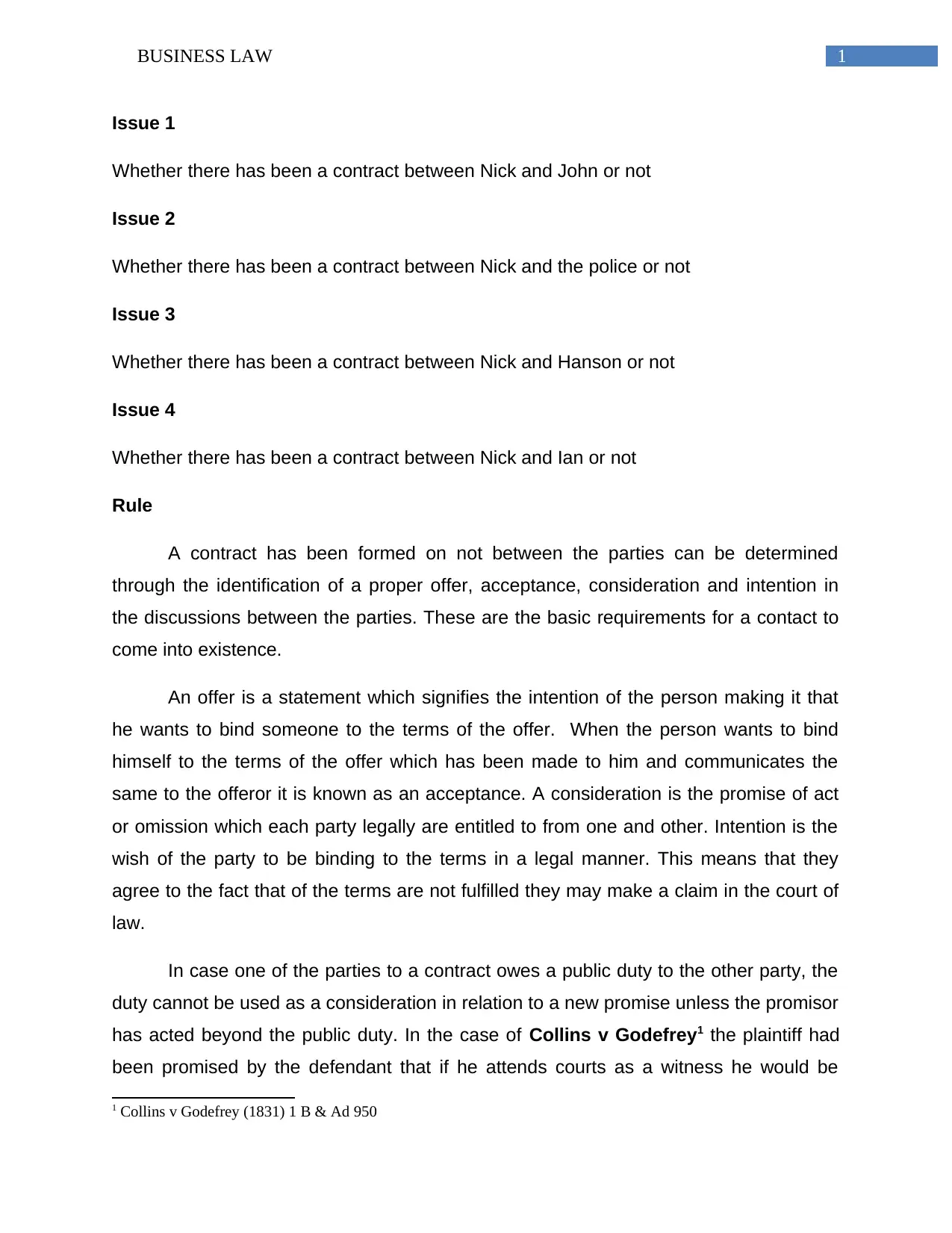
1BUSINESS LAW
Issue 1
Whether there has been a contract between Nick and John or not
Issue 2
Whether there has been a contract between Nick and the police or not
Issue 3
Whether there has been a contract between Nick and Hanson or not
Issue 4
Whether there has been a contract between Nick and Ian or not
Rule
A contract has been formed on not between the parties can be determined
through the identification of a proper offer, acceptance, consideration and intention in
the discussions between the parties. These are the basic requirements for a contact to
come into existence.
An offer is a statement which signifies the intention of the person making it that
he wants to bind someone to the terms of the offer. When the person wants to bind
himself to the terms of the offer which has been made to him and communicates the
same to the offeror it is known as an acceptance. A consideration is the promise of act
or omission which each party legally are entitled to from one and other. Intention is the
wish of the party to be binding to the terms in a legal manner. This means that they
agree to the fact that of the terms are not fulfilled they may make a claim in the court of
law.
In case one of the parties to a contract owes a public duty to the other party, the
duty cannot be used as a consideration in relation to a new promise unless the promisor
has acted beyond the public duty. In the case of Collins v Godefrey1 the plaintiff had
been promised by the defendant that if he attends courts as a witness he would be
1 Collins v Godefrey (1831) 1 B & Ad 950
Issue 1
Whether there has been a contract between Nick and John or not
Issue 2
Whether there has been a contract between Nick and the police or not
Issue 3
Whether there has been a contract between Nick and Hanson or not
Issue 4
Whether there has been a contract between Nick and Ian or not
Rule
A contract has been formed on not between the parties can be determined
through the identification of a proper offer, acceptance, consideration and intention in
the discussions between the parties. These are the basic requirements for a contact to
come into existence.
An offer is a statement which signifies the intention of the person making it that
he wants to bind someone to the terms of the offer. When the person wants to bind
himself to the terms of the offer which has been made to him and communicates the
same to the offeror it is known as an acceptance. A consideration is the promise of act
or omission which each party legally are entitled to from one and other. Intention is the
wish of the party to be binding to the terms in a legal manner. This means that they
agree to the fact that of the terms are not fulfilled they may make a claim in the court of
law.
In case one of the parties to a contract owes a public duty to the other party, the
duty cannot be used as a consideration in relation to a new promise unless the promisor
has acted beyond the public duty. In the case of Collins v Godefrey1 the plaintiff had
been promised by the defendant that if he attends courts as a witness he would be
1 Collins v Godefrey (1831) 1 B & Ad 950
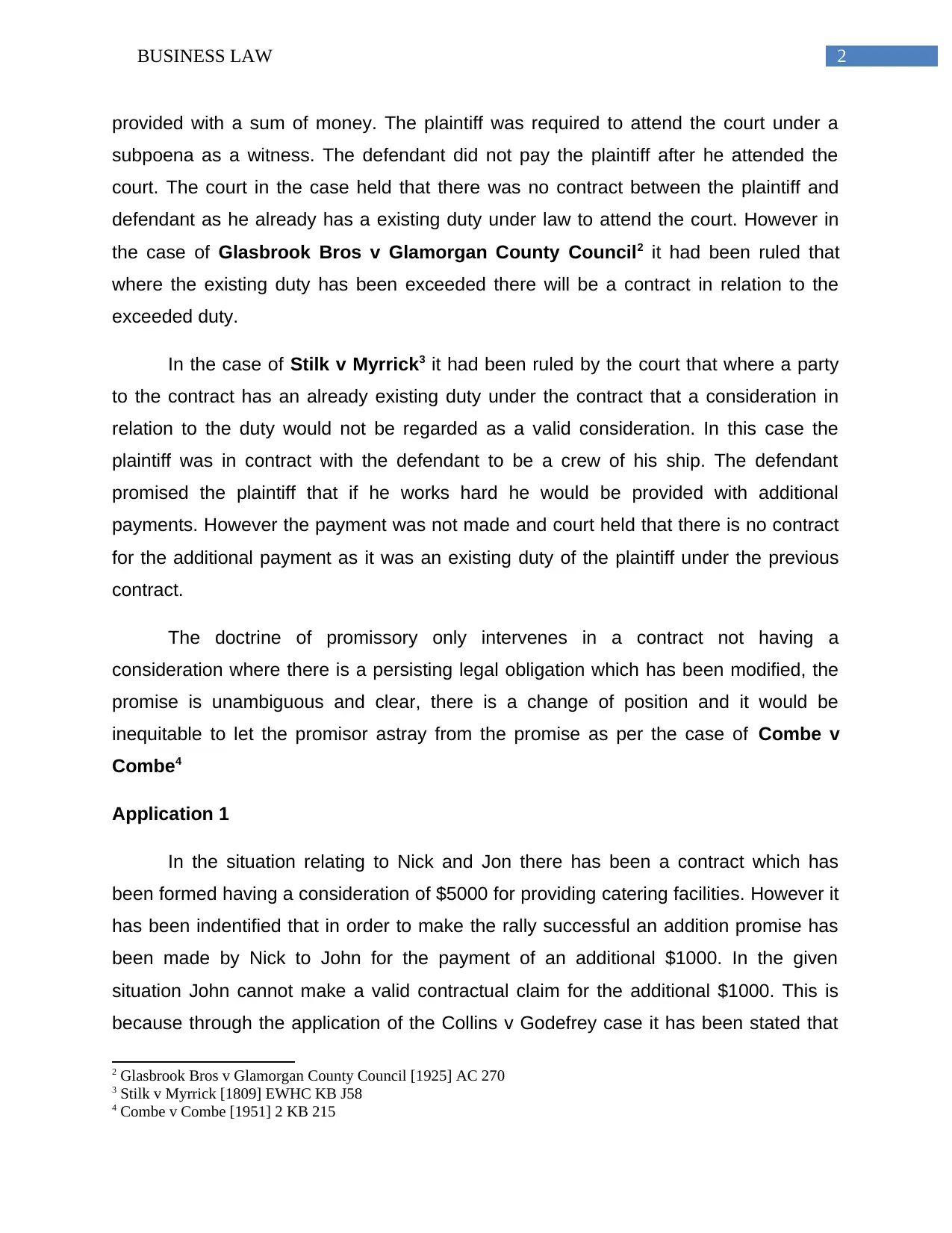
2BUSINESS LAW
provided with a sum of money. The plaintiff was required to attend the court under a
subpoena as a witness. The defendant did not pay the plaintiff after he attended the
court. The court in the case held that there was no contract between the plaintiff and
defendant as he already has a existing duty under law to attend the court. However in
the case of Glasbrook Bros v Glamorgan County Council2 it had been ruled that
where the existing duty has been exceeded there will be a contract in relation to the
exceeded duty.
In the case of Stilk v Myrrick3 it had been ruled by the court that where a party
to the contract has an already existing duty under the contract that a consideration in
relation to the duty would not be regarded as a valid consideration. In this case the
plaintiff was in contract with the defendant to be a crew of his ship. The defendant
promised the plaintiff that if he works hard he would be provided with additional
payments. However the payment was not made and court held that there is no contract
for the additional payment as it was an existing duty of the plaintiff under the previous
contract.
The doctrine of promissory only intervenes in a contract not having a
consideration where there is a persisting legal obligation which has been modified, the
promise is unambiguous and clear, there is a change of position and it would be
inequitable to let the promisor astray from the promise as per the case of Combe v
Combe4
Application 1
In the situation relating to Nick and Jon there has been a contract which has
been formed having a consideration of $5000 for providing catering facilities. However it
has been indentified that in order to make the rally successful an addition promise has
been made by Nick to John for the payment of an additional $1000. In the given
situation John cannot make a valid contractual claim for the additional $1000. This is
because through the application of the Collins v Godefrey case it has been stated that
2 Glasbrook Bros v Glamorgan County Council [1925] AC 270
3 Stilk v Myrrick [1809] EWHC KB J58
4 Combe v Combe [1951] 2 KB 215
provided with a sum of money. The plaintiff was required to attend the court under a
subpoena as a witness. The defendant did not pay the plaintiff after he attended the
court. The court in the case held that there was no contract between the plaintiff and
defendant as he already has a existing duty under law to attend the court. However in
the case of Glasbrook Bros v Glamorgan County Council2 it had been ruled that
where the existing duty has been exceeded there will be a contract in relation to the
exceeded duty.
In the case of Stilk v Myrrick3 it had been ruled by the court that where a party
to the contract has an already existing duty under the contract that a consideration in
relation to the duty would not be regarded as a valid consideration. In this case the
plaintiff was in contract with the defendant to be a crew of his ship. The defendant
promised the plaintiff that if he works hard he would be provided with additional
payments. However the payment was not made and court held that there is no contract
for the additional payment as it was an existing duty of the plaintiff under the previous
contract.
The doctrine of promissory only intervenes in a contract not having a
consideration where there is a persisting legal obligation which has been modified, the
promise is unambiguous and clear, there is a change of position and it would be
inequitable to let the promisor astray from the promise as per the case of Combe v
Combe4
Application 1
In the situation relating to Nick and Jon there has been a contract which has
been formed having a consideration of $5000 for providing catering facilities. However it
has been indentified that in order to make the rally successful an addition promise has
been made by Nick to John for the payment of an additional $1000. In the given
situation John cannot make a valid contractual claim for the additional $1000. This is
because through the application of the Collins v Godefrey case it has been stated that
2 Glasbrook Bros v Glamorgan County Council [1925] AC 270
3 Stilk v Myrrick [1809] EWHC KB J58
4 Combe v Combe [1951] 2 KB 215
⊘ This is a preview!⊘
Do you want full access?
Subscribe today to unlock all pages.

Trusted by 1+ million students worldwide
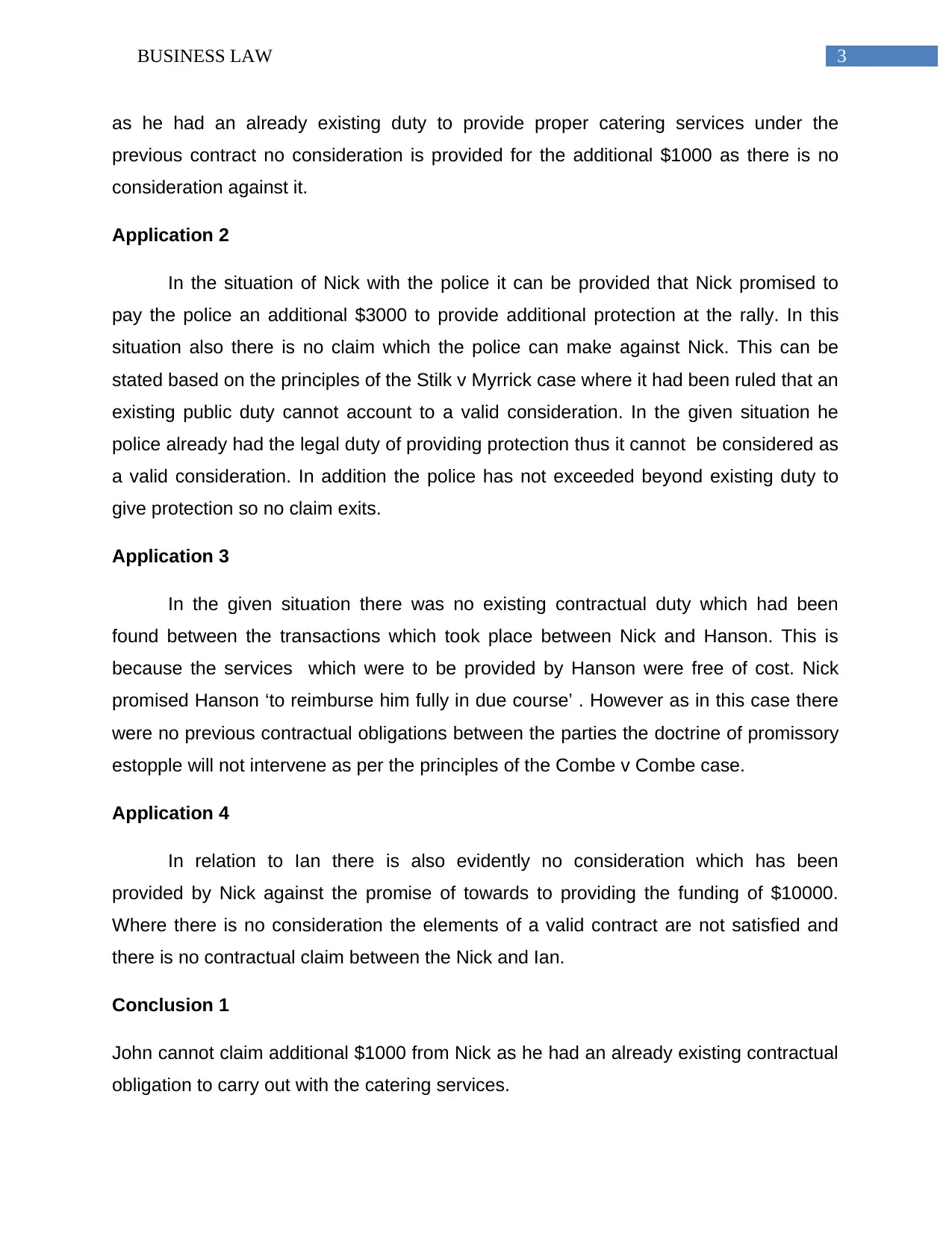
3BUSINESS LAW
as he had an already existing duty to provide proper catering services under the
previous contract no consideration is provided for the additional $1000 as there is no
consideration against it.
Application 2
In the situation of Nick with the police it can be provided that Nick promised to
pay the police an additional $3000 to provide additional protection at the rally. In this
situation also there is no claim which the police can make against Nick. This can be
stated based on the principles of the Stilk v Myrrick case where it had been ruled that an
existing public duty cannot account to a valid consideration. In the given situation he
police already had the legal duty of providing protection thus it cannot be considered as
a valid consideration. In addition the police has not exceeded beyond existing duty to
give protection so no claim exits.
Application 3
In the given situation there was no existing contractual duty which had been
found between the transactions which took place between Nick and Hanson. This is
because the services which were to be provided by Hanson were free of cost. Nick
promised Hanson ‘to reimburse him fully in due course’ . However as in this case there
were no previous contractual obligations between the parties the doctrine of promissory
estopple will not intervene as per the principles of the Combe v Combe case.
Application 4
In relation to Ian there is also evidently no consideration which has been
provided by Nick against the promise of towards to providing the funding of $10000.
Where there is no consideration the elements of a valid contract are not satisfied and
there is no contractual claim between the Nick and Ian.
Conclusion 1
John cannot claim additional $1000 from Nick as he had an already existing contractual
obligation to carry out with the catering services.
as he had an already existing duty to provide proper catering services under the
previous contract no consideration is provided for the additional $1000 as there is no
consideration against it.
Application 2
In the situation of Nick with the police it can be provided that Nick promised to
pay the police an additional $3000 to provide additional protection at the rally. In this
situation also there is no claim which the police can make against Nick. This can be
stated based on the principles of the Stilk v Myrrick case where it had been ruled that an
existing public duty cannot account to a valid consideration. In the given situation he
police already had the legal duty of providing protection thus it cannot be considered as
a valid consideration. In addition the police has not exceeded beyond existing duty to
give protection so no claim exits.
Application 3
In the given situation there was no existing contractual duty which had been
found between the transactions which took place between Nick and Hanson. This is
because the services which were to be provided by Hanson were free of cost. Nick
promised Hanson ‘to reimburse him fully in due course’ . However as in this case there
were no previous contractual obligations between the parties the doctrine of promissory
estopple will not intervene as per the principles of the Combe v Combe case.
Application 4
In relation to Ian there is also evidently no consideration which has been
provided by Nick against the promise of towards to providing the funding of $10000.
Where there is no consideration the elements of a valid contract are not satisfied and
there is no contractual claim between the Nick and Ian.
Conclusion 1
John cannot claim additional $1000 from Nick as he had an already existing contractual
obligation to carry out with the catering services.
Paraphrase This Document
Need a fresh take? Get an instant paraphrase of this document with our AI Paraphraser
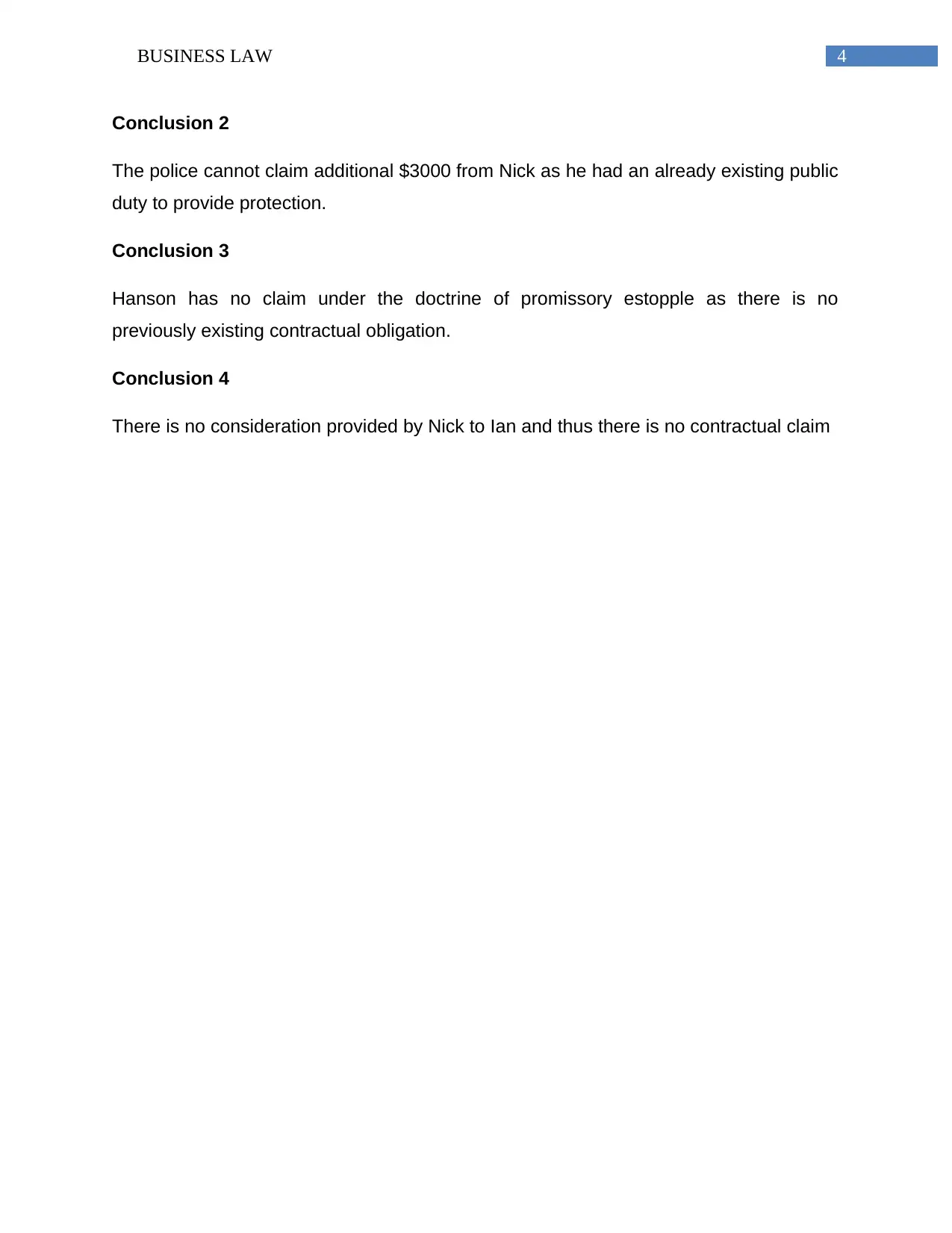
4BUSINESS LAW
Conclusion 2
The police cannot claim additional $3000 from Nick as he had an already existing public
duty to provide protection.
Conclusion 3
Hanson has no claim under the doctrine of promissory estopple as there is no
previously existing contractual obligation.
Conclusion 4
There is no consideration provided by Nick to Ian and thus there is no contractual claim
Conclusion 2
The police cannot claim additional $3000 from Nick as he had an already existing public
duty to provide protection.
Conclusion 3
Hanson has no claim under the doctrine of promissory estopple as there is no
previously existing contractual obligation.
Conclusion 4
There is no consideration provided by Nick to Ian and thus there is no contractual claim

5BUSINESS LAW
Bibliography
Collins v Godefrey (1831) 1 B & Ad 950
Combe v Combe [1951] 2 KB 215
Glasbrook Bros v Glamorgan County Council [1925] AC 270
Stilk v Myrrick [1809] EWHC KB J58
Bibliography
Collins v Godefrey (1831) 1 B & Ad 950
Combe v Combe [1951] 2 KB 215
Glasbrook Bros v Glamorgan County Council [1925] AC 270
Stilk v Myrrick [1809] EWHC KB J58
⊘ This is a preview!⊘
Do you want full access?
Subscribe today to unlock all pages.

Trusted by 1+ million students worldwide
1 out of 6
Related Documents
Your All-in-One AI-Powered Toolkit for Academic Success.
+13062052269
info@desklib.com
Available 24*7 on WhatsApp / Email
![[object Object]](/_next/static/media/star-bottom.7253800d.svg)
Unlock your academic potential
Copyright © 2020–2026 A2Z Services. All Rights Reserved. Developed and managed by ZUCOL.



